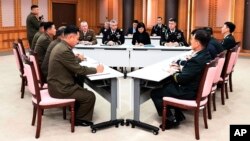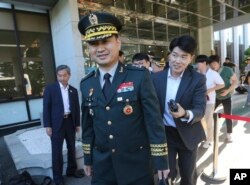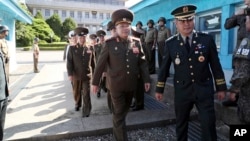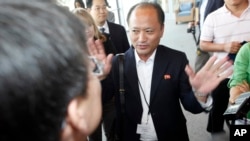North and South Korea continued joint military talks Friday in the truce-village of Panmunjom. The talks took place as the Joint Security Area (JSA) began implementing new protocols designed to reduce tension, while North Korea continued criticizing the United States’ push for continued sanctions.
Military officials with the rank of general met in Tongilgak, a North Korean building located within the JSA, inside the Demilitarized Zone (DMZ) separating the Koreas.
The talks began at 10 a.m. local time and were headed by South Korean Major Gen. Kim Do-gyun and his northern counterpart, Lt. Gen. An Ik San.
Before departing for the talks, Kim told reporters, “Through today’s military talks, we will conduct an interim review of what we have so far implemented and discuss what we will enforce in the future.”
He added, “We will make our utmost efforts to play a core role in ensuring that we can facilitate the efforts for the denuclearization of the peninsula and the establishment of peace by enforcing the Sept. 19 military agreement normally.”
De-escalation measures
During the third inter-Korean summit held in Pyongyang, Sept. 18-20, the two Korean militaries signed a comprehensive military agreement, independent of their respective leaders’ joint declaration.
Seoul and Pyongyang vowed to begin a number of de-escalation measures that included removing 11 guard posts within a one kilometer radius of the Military Demarcation Line (MDL) by the end of this year, the establishment of no-fly and no-sail zones, and more.
According to Seoul’s defense ministry, Friday’s focus is on the formation and operational mechanism of an inter-Korean military committee entrusted with the enforcement of the comprehensive military agreement.
Furthermore, it’s expected the two sides will discuss how best to form a joint research team for an area of the Han River that’s been closed off to civilians because of escalating tensions.
An arms-free JSA
Meanwhile, the two Koreas and the United Nations Command moved ahead with plans to de-escalate tension in the truce village of Panmunjom on Friday.
The Joint Security Area is the only portion of the 250 kilometer fortified border separating the two countries where soldiers from North and South Korea, along with members of the United Nations Command (UNC), face one another.
Beginning Friday, there will be no armed personnel inside the JSA of the Korean Demilitarized Zone.
“Just until recently, the militaries of the two Koreas had pointed guns against each other at the frontlines of confrontation and conflict,” said South Korean Major Gen. Kim Do-gyun during his opening remarks at Friday’s talks. “But I feel great as the militaries are at the forefront of the efforts to realize our Koreans’ ideology by upholding the wishes of our leaders.”
North Korea, South Korea, and the UNC agreed last week to implement a wide range of tension-reducing measures outlined in the comprehensive military agreement.
In addition to the elimination of firearms, both sides will also reduce the number of personnel stationed in Panmunjom to 35, to bring the number of personnel in the JSA in line with the 1953 armistice agreement.
Once disarmament has been mutually verified, it’s expected tourists from the North and South will be able to freely move about the area, something that’s not happened since 1976, when two American soldiers were killed by ax-wielding North Korean troops.
Pyongyang calls for an end to sanctions
A North Korean official once more called for the immediate lifting of sanctions against Pyongyang by the United States on Thursday.
Washington has repeatedly said sanctions on North Korea will remain in place until North Korea abandons its nuclear weapons and ballistic missile programs.
The United Nations sanctions in place on Pyongyang are designed to sever the resources necessary for Pyongyang to develop the North’s weapons programs and deplete its cash reserves.
At a defense forum in Beijing, Song Il Hyok, deputy director general of the North Korean foreign ministry’s Institute for Disarmament and Peace, said, “We think that sanctions and pressure do more harm than good.”
He continued saying that the sanctions “are not at all” confidence-building measures “but confidence-destroying measures” and called for immediate relief.
Speaking in Seoul earlier this month, former U.S. National Security Adviser General H.R. McMaster said that “while we all hope that Chairman Kim Jong Un is undergoing a radical change of heart, we must remain alert.”








